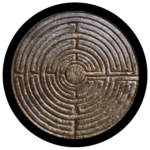 I believe very strongly that what each of us really wants is to feel whole, alive and to be living a deeply fulfilled existence, and I always feel honored to be a part of what brings another to that place within themselves. I consider therapy to be a deeply resonant way to co-create those ways of being that we wish to see in ourselves and in the world, and as such always consider myself to be more of an engaged collaborator and less of distant expert, providing support and offering guidance as you find what it is that you want.
I believe very strongly that what each of us really wants is to feel whole, alive and to be living a deeply fulfilled existence, and I always feel honored to be a part of what brings another to that place within themselves. I consider therapy to be a deeply resonant way to co-create those ways of being that we wish to see in ourselves and in the world, and as such always consider myself to be more of an engaged collaborator and less of distant expert, providing support and offering guidance as you find what it is that you want.
At the same time, I draw upon over 20 years of experience and training to provide you with tools and ideas for new ways of being that you might not be able to find on your own. Often we get lost in our journey towards a healthier self, go down a wrong path if you will, and get stuck in ways of dealing with things that may have worked once, but no longer continue to do so. We may have experienced trauma, abuse, or parents who were unable to give us what we needed. We may have had outwardly “normal” experiences that still left us feeling out of sorts, depressed, anxious, or unable to have satisfying relationships. Whatever the reason for the possible missteps we may have taken, it is my task to assist you in locating these outdated ways of dealing with the vagaries of life, and to help you discover more authentic and potentially fulfilling alternatives.
Essential Approach
I believe strongly that everything is interrelated, and as such approach the practice of psychotherapy from a highly holistic, experiential viewpoint. Research in the field increasingly shows that the most effective techniques for lasting change are those that integrate body, mind and spirit, as well as those which operate more from an approach that operates in the moment and utilizes clients’ actual experiences. If we picked up our difficulties through our experiences, does it not make sense to work on them through the same access point? As such, I am most attracted to techniques such as Hakomi (a mindfulness-based, experiential modality) that allow for the nurturing of those experiences in a safe, supportive environment.
Recent research has repeatedly shown that it is often the relationship between therapist and client that in the end is the most powerful factor in healing. Neuropsychology advances are changing the way that we think about how therapy works, and one of the most profound examples of that is what we now know about how relationships are formed and maintained in the brain. The limbic part of our brain is the part that’s based on relationship; only those species that spend time nurturing and raising young have developed limbic brains, because they need relationships in order to survive. In terms of how this affects therapy, A General Theory of Love puts it perhaps most succinctly: “When a limbic connection has established a neural pattern, it takes a limbic connection to revise it.” As such, in order to change our relationships (both with ourselves and with others), we have to do so from within one.
As a background to these fundamental approaches, I bring to the table my education and interests in the fields of integral psychology, mindfulness-based practices, complexity theory, living systems theories, gender and sexual variance, intentional communities, nonviolence, earth-based and other spiritual practices, dance (& other body-centered forms of expression), and neuroscience. I have a wide range of passions and interests, all of which I draw upon daily in my counseling practice with clients.
It is my hope that this has given you a better sense of what I bring to the table. Don’t let the fancy words fool you — I may have gone into a lot of detail here about my training and educational influences, but that’s just to give you a more complete understanding of where I’m coming from. In the end, it’s much more important to just be myself, in the room with another person, helping them to be themselves.
